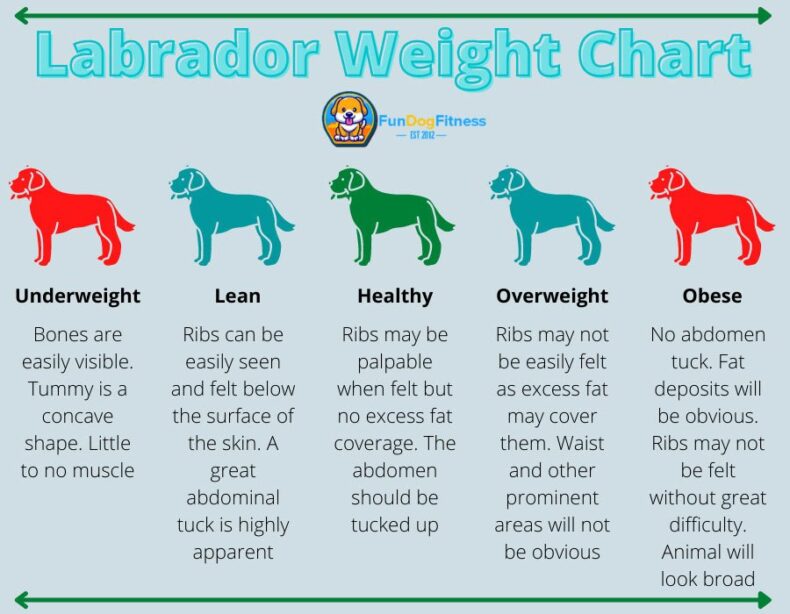Labradors are a popular breed of dog, known for their loyalty, intelligence, and friendly nature. However, Labradors also have a predisposition to being overweight, fat, or generally too heavy. This is due to a combination of factors, including their large size, their love of food, and their sedentary lifestyle. While a little extra weight may not seem like a big deal, it can actually cause health problems for Labradors that are the wrong weight. So what is a healthy Labrador weight and why does it matter using our chart?
Overweight dogs are more likely to suffer from joint problems, respiratory difficulties, and diabetes if they are carrying too much fat on their body.
As such, it’s important for owners of overweight Labradors to take steps to help their dog slim down. This may include reducing portion sizes, increasing exercise levels, and avoiding high-calorie treats. By taking these measures, owners can help their Labradors live longer, healthier lives.
Why are Labradors at risk of weight problems?
One of the most common health problems facing Labradors is obesity. There are a number of reasons why these dogs tend to be overweight, including their love of food and their lifestyle. Labradors are known for their voracious appetites, and they will often eat anything that they can get their paws on. This can lead to body mass gain if they are not given adequate exercise.

In addition, Labradors are very active dogs, and they require a lot of exercise to stay healthy. However, many owners do not provide their dogs with the necessary amount of exercise, resulting in weight gain. Obesity can have serious consequences for dogs, including joint problems, respiratory difficulties, and diabetes.
As a result, it is important for owners to ensure that their Labradors get plenty of exercise and eat a healthy diet.
The main reasons for dog obesity in this breed are summarized below:
1. Lack of exercise
2. Poor diet
3. Lack of portion control
4. Lack of self-control
5. Genetics
6. Overfeeding
7. Treats
What should a healthy Labrador weigh ideally?
A healthy Labrador should have a weight range of 55 to 80 pounds. This is 24-36 KG in the UK. This weight range is determined by a number of factors, including the dog’s age, sex, and height. For example, a young male Labrador will typically weigh more than an adult female. Similarly, a taller dog will usually weigh more than a shorter one. While there is some variation within the breed, Labs that fall outside of the healthy weight range are more susceptible to health problems. For instance, obese Labs are more likely to develop joint problems, while underweight dogs may have difficulty regulating their body temperature. As such, it is important to ensure that your Labrador maintains healthy poundage.
Free Labrador weight chart
A Labrador body mass chart can be an extremely useful tool for pet owners. Even if you do not know your dog’s BMI (body mass index) it can help you keep track of your dog’s weight, and make sure that they are getting the right amount of food. It can also help you spot health problems early on, and get your dog to the vet for treatment.
There are a number of different weight charts available online like the one below, and they are usually free to download. If you have a Labrador, or are thinking about getting one, then a weight chart is definitely something that you should consider looking at like the one below.

Labrador Body Mass & Weight By Age
Labradors come in two sizes: standard and miniature. Standard Labradors weigh between 55 and 80 pounds in line with the chart above, while miniature Labradors weigh between 30 and 50 pounds. Labrador puppies typically weigh between 2 and 4 pounds at birth and this changes as they age.
For the first few weeks of life, Labradors gain weight rapidly, doubling their birth weight by two weeks of age. From there, they continue to gain weight steadily until they reach adulthood.
The average Labrador reaches its full adult weight by 18 months of age. However, smaller or larger individuals may take longer to reach their full size. For example, a standard Labrador that weighs 70 pounds at 18 months old may continue to fill out and reach 75 or even 80 pounds as an adult.
On the other hand, a miniature Labrador that only weighs 45 pounds at 18 months old is unlikely to gain any more body fat or weight.
Labrador weights can vary significantly from one individual to the next, but this breed generally maintains a fairly consistent size throughout its life. You can use the weight chart above as your Lab increases in age.
Labrador puppy weight
Labrador puppies are born small, but they grow quickly. On average, Labrador puppies will double their birth weight by one week old. They will triple their birth weight by two weeks old. By the time they are six weeks old, Labrador puppies will typically be about half of their adult heaviness. Then you can use the weight chart above to see how well your adult Labrador is in line.
After six weeks, their growth rate will begin to slow down, but they will continue to put on weight until they reach adulthood at around one year old. The average adult Labrador weighs anywhere from 55 to 80 pounds, although some Labrador mixes may be larger or smaller.
Labrador puppies typically reach their full adult size between 12 and 18 months old. However, they may continue to fill out and fill in until they are two years old. Some Labs may even continue to grow until they are three years old! monitoring your Labrador puppy’s body mass is a good way to ensure that they are growing at a healthy rate.
If you are concerned about your Labrador puppy’s body size, or if they seem to be growing too slowly or too quickly, consult your veterinarian for guidance.
A 6-month old Labrador should weigh in at around 18 to 23 kg (UK), depending on the gender and build of the dog. Generally, male Labs will be on the higher end of that weight range, while females will be on the lower end. If your dog is significantly under or overweight, it may be indicative of a health problem and you should consult with your veterinarian.
Labs are known for being active and energetic dogs, so make sure to provide plenty of opportunities for exercise and playtime to avoid the buildup of too much fat. An adult Labrador usually weighs between 25 and 30 kg, so your pup still has some growing to do! Keep up the good work with nutrition and exercise, and you’ll have a happy and healthy dog in no time.
In conclusion
While the average weight of a full-grown labrador retriever is around 55 pounds, there is significant variation among individual dogs. Some labradors will weigh as little as 40 pounds, while others may reach 70 pounds or more.
The size of a labrador also depends on factors such as gender and whether the dog is spayed or neutered. In general, male labradors are larger than females, and intact dogs tend to be heavier and have more fat than those that have been spayed or neutered. See how to tell if your dog is fat for more information if you are worried. Also, check up on your dog’s BMI for more clues.
However, diet and exercise can also play a role in a labrador’s weight. For example, a labrador that eats a lot of high-calorie food may be overweight, even if it is not particularly large for its breed. Ultimately, the best way to determine whether a labrador is at a healthy weight is to consult with a veterinarian who has special scales for measuring how heavy a dog is.
